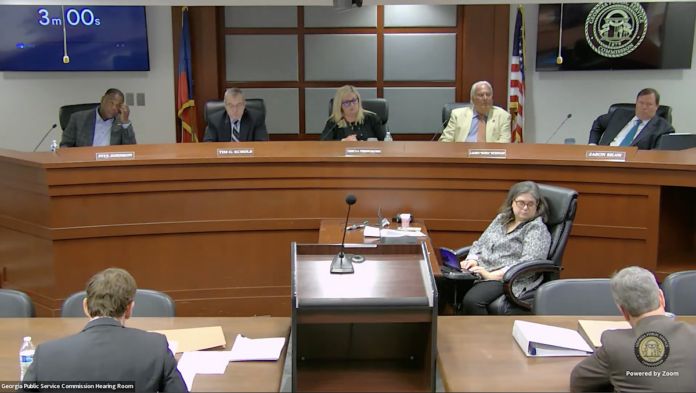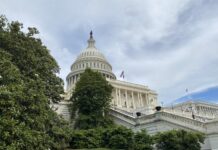
(Georgia Recorder) — Two consumer advocacy groups filed a lawsuit Wednesday claiming that Georgia lawmakers have illegally extended the terms of state utility regulators in violation of the state constitution and federal protections for due process.
The U.S. District Court lawsuit seeks to overturn the April passage of House Bill 1312, which delays the election of all five Georgia Public Service Commissioners by at least one year, and in most cases by two years. According to the lawsuit filed by the executive directors of the Georgia WAND Education Fund and the Georgia Conservation Voters Education Fund, PSC terms cannot be extended without constitutional amendment under Georgia’s constitution.
Attorney Bryan Sells, who represents the plaintiffs, said it makes sense for several commissioners to face opponents as soon as possible, which could include primaries in November. Critics of HB 1312 contend the legislation could prevent the election of Democrats to the commission, now made up of five Republicans.
The lawsuit comes on the heels of another complaint that the five commissioners were elected statewide rather than in separate district elections. This spring, the U.S. Supreme Court refused to consider that case after the 11th U.S. Court of Appeals overturned a ruling that found the statewide method diluted the rights of Black voters in Georgia.
Kim Scott, executive director of Georgia WAND, said voters should be represented by PSC members who understand the burden of rising electricity rates on consumers.
The PSC oversees most investor-owned electric, gas, and telecommunications utilities in Georgia, including Georgia Power. Over the past few years, Georgia Power has successfully petitioned the PSC several times to increase rates, including to cover the $35 billion nuclear power expansion of Plant Vogtle.
The PSC has ignored requests to stop saddling customers with the rising costs of Vogtle and other rate hikes that burden many of Georgia Power’s more than 2.7 million customers.
“HB 1312 was in clear violation of not only our Georgia State Constitution that mandates the terms of the members of the commissioners being six years, but also our right to vote for elected representation,” Scott said during a media briefing on Wednesday.

Patty Durand, a candidate for the PSC in 2022, said many people are unhappy with high bills after a long history of Vogtle problems dating back to 2017 when the main contractor, Westinghouse Electric Co., went bankrupt. Although the PSC had the opportunity to cancel the project, it moved forward despite its staff’s recommendation to mothball the plant when it was partially complete.
This year’s legislation appears to let state regulators avoid the intense backlash that came with Georgia Power’s approval of expanding fossil fuel production, Durand said.
“Ironically, the same month that Plant Vogtle was completed, Georgia Power and the commission were celebrating… the Commission voted to expand fossil fuels in Georgia by more than twice as much with new gas plants and continuing coal plants and oil while they block clean energy that customers were begging the commission to adopt,” Durand said.
Brionté McCorkle, executive director of Georgia Conservation Voters, said as Georgians struggle to keep up with rising costs for food, housing, and energy, the Public Service Commission has sold out to the power company’s interests.
“People have now been outright denied their right to vote for commissioners for two election cycles,” she said. “We have not had an election since a full election, since 2020 and while the incumbent commissioners have remained in office, they have rubber stamped every rate increase.”







